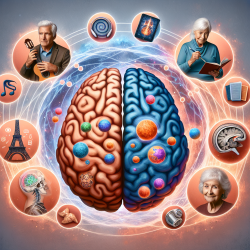Introduction
As practitioners in the field of education and therapy, understanding the cognitive benefits of bilingualism can significantly enhance the services we provide. Recent research, such as the study "Cognitive control, cognitive reserve, and memory in the aging bilingual brain," highlights the profound impact bilingualism has on cognitive control and memory, particularly in aging individuals. This blog explores how these findings can be applied to improve therapy practices and encourages further research into this fascinating area.
The Cognitive Benefits of Bilingualism
Bilingualism is not merely a linguistic skill but a cognitive enhancer. Research indicates that bilingual individuals often exhibit superior executive control abilities, including task-switching, inhibition, and conflict monitoring. These skills are attributed to the constant need for language control, which strengthens cognitive pathways.
Moreover, bilingualism has been linked to a delay in the onset of age-related cognitive decline, such as Alzheimer's disease, by an average of 4 to 4.5 years. This delay is attributed to the concept of cognitive reserve, which suggests that the brain's ability to handle pathology is enhanced through enriched experiences like bilingualism.
Implications for Practitioners
Practitioners can leverage these insights by incorporating bilingual exercises and activities into their therapy sessions. Here are some practical steps:
- Integrate Language Learning: Encourage clients, especially older adults, to engage in learning a new language. This can be done through interactive online platforms or community classes.
- Cognitive Exercises: Design activities that mimic the cognitive demands of bilingualism, such as tasks that require switching between different types of information or inhibiting responses.
- Monitor Progress: Regularly assess the cognitive progress of clients engaging in bilingual activities to measure improvements in executive control and memory.
Encouraging Further Research
While the current research provides valuable insights, there is still much to explore. Practitioners are encouraged to collaborate with researchers to investigate the long-term effects of bilingualism on cognitive health. This could involve longitudinal studies tracking cognitive changes in bilingual individuals over time.
Additionally, exploring the neural mechanisms underlying these cognitive benefits can provide deeper understanding and lead to more targeted therapeutic interventions.
Conclusion
The intersection of bilingualism and cognitive health offers promising avenues for enhancing therapy practices. By integrating bilingual activities and supporting further research, practitioners can contribute to the cognitive well-being of their clients, particularly as they age.
To read the original research paper, please follow this link: Cognitive control, cognitive reserve, and memory in the aging bilingual brain.










